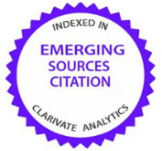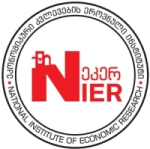Management of the national economy as an element of the socio-economic space of the country
Abstract
Introduction. The interest in the problem of public administration in the development of a country's national economy is increasing. Such questions are always in line with the interests of economic theory and business practice. Under the influence of factors, the national economy of Ukraine is transforming into a whole organism, which, under the influence of factors, loses some signs and acquires new ones.
Aim and tasks. The aim of the research is to develop the conceptual apparatus for managing the national economy as an element of social economic space of the country.
Results. The result of the study is the development of a conceptual apparatus for managing the national economy as an element of the socio-economic space of the country . First of all, the system of economic and social connections and relations between subjects of the national economy, related to the implementation of economic activity and the satisfaction of the social needs of the population, is functioning. Secondly, management of the national economy is carried out, which is related to the accumulation of resources (production, financial and investment, scientific and technical, informational, etc.) necessary for the uninterrupted implementation of various types of economic activity of subjects and the satisfaction of the social needs of society, as well as their effective distribution and use. Thirdly, the interests of all participants in the processes of functioning and development of the national economy as an open, complex socio-economic system intersect. Fourthly, certain features depending on the specific country (national features) are revealed. Finally, the economic and social components of the management orientation of the national economy and its separate elements are organically combined, which ensures their close interaction and complementarity.
Conclusions. The statement that the national economy is an element of the socio-economic space can be considered fully justified, given that the study of the national economy in terms of its belonging to the socio-economic space gives the most comprehensive and accurate idea of the reality, the presence of connections and relations inherent in the objects operating within it and allows for more effective management of the national economy.
Keywords:
national economy, globalization, public administration, efficiency, economic policy, managemeReferences
Didenko, A., Kovalenko-Marchenkova, Y., Kravets, O., & Lizut R. (2021). Cognitive approach to modeling populationʼs quality of life. Philosophy, Economics and Law Review, 1 (2), 92-100.
Horina, H. (2016). Study of the etymology of the concept of «economic space» as the basis of the categorical apparatus of the phenomenon of spatial polarization. Agrosvit, 17, 60-65.
Kadylnykova, T., & Savkin, S. (2021). Increasing the efficiency of managing the financial results of market activities. Philosophy, Economics and Law Review, 1 (1), 37-42.
Kovalenko-Marchenkova, Ye. (2019). Economic insecurity transformation in conditions of structural modernization of the Ukrainian economy. Economic security at risk: findings from digitalization of the national economy, 5, 37-63.
Kuharska, N., Zabarna, E., & Zadorozhnyuk, N. (2020). National economy: theory, methodology and modern trends of transformation. Kherson: Oldi+, pp. 223-230.
Lorentzen, A. (2007). The Spatial Dimension of Innovation: embedding proximity in socio-economic space.Institut for Samfundsudvikling og Planlægning, Aalborg Universitet.
Martseniuk, L., Cherniak, N., & Tishchenkova, S. (2020). Economy, public administration and legal relations under the permanent armed conflicts: Paradoxes and regularities of development. Economic Annals – XXI, 181 (1-2), 4-17.
Matviyenko, R. (2013). The mechanism of formation of the «space» category. Actual problems of the economy, 6 (144), 17-20.
Nazarenko, S. (2015). Features of the development of market social and economic space. Proceedings of Scientific Works of Cherkasy State University, 40 (2), 5-11.
Polishchuk, A. (2021). Economic space in modern scientific discourse. Proceedings of Scientific Works of Cherkasy State University, 62, 33-34.
Pryputen, D. (2019). Innovative approaches in the economic sphere. Baltic Journal of Economic Studies, 5 (4), 92-96.
Rybalchenko, L., Ryzhkov, Ed., & Ohrimenco, S. (2021). Modeling economic component of national security. Philosophy, Economics and Law Review, Vol. 1 (1). Pp. 25-36.
Shevchenko, S., & Munko, A. (2021). Public administration in the economic sphere of Ukraine: Strategic approach. Estudios de Economia Aplicada, Vol. 39 (5). Pp. 1-9.
Shults, S. (2010). Economic space of Ukraine: formation, structuring and management. Institute of Regional Studies of the National Academy of Sciences of Ukraine. Lviv, 390 p.
Sommers, L. M., Mehretu, A., & Pigozzi, B. W. (2019). Towards typologies of socio-economic marginality: north/south comparisons. In Marginality in Space–Past, Present and Future (pp. 7-24). Routledge.
Verkhoglyadova, N., Kononova, I., Morozova, Ye., Kubetska, O., & Kovalenko-Marchenkova, Ye. (2022). Management of structural changes in the system of economic formation of sustainable development. Naukovyi Visnyk Natsionalnoho Hirnychoho Universytetu, 2, 135-140.
Wilkerson, M. L., Mitchell, M. G., Shanahan, D., Wilson, K. A., Ives, C. D., Lovelock, C. E., & Rhodes, J. R. (2018). The role of socio-economic factors in planning and managing urban ecosystem services. Ecosystem Services, 31, 102-110.
Zolotukhina, L. (2021). Economic security management at the meso-level: Methodological and legal approach. Regional Science Inquiry, 1, 201-216.
If the article is accepted for publication in the journal «Economics. Ecology. Socium» the author must sign an agreementon transfer of copyright. The agreement is sent to the postal (original) or e-mail address (scanned copy) of the journal editions.






















